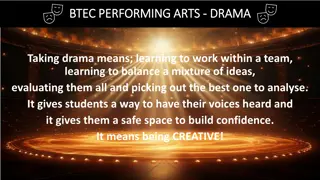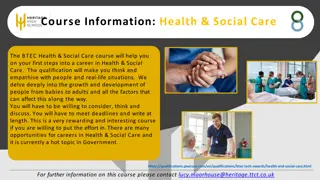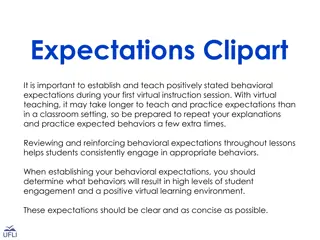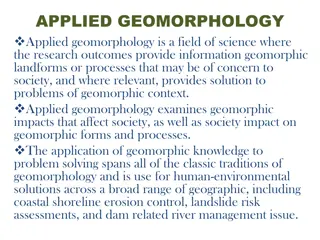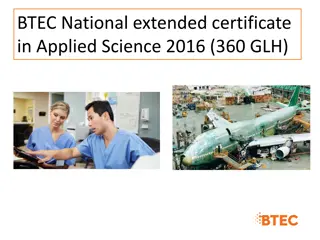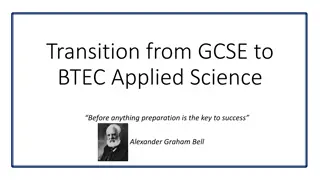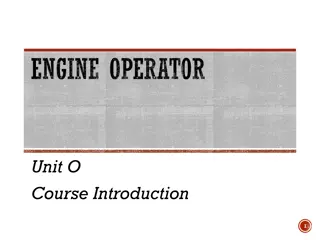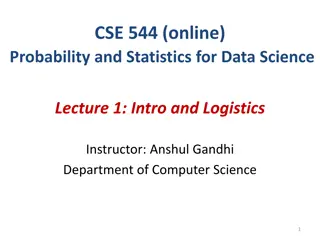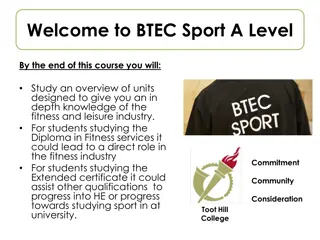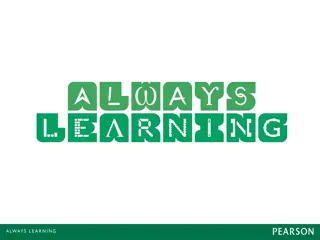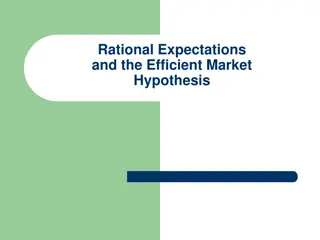Exploring BTEC Applied Science: Course Overview and Expectations
Delve into the world of BTEC Applied Science through this PowerPoint presentation designed to introduce you to the course, its content, and assessments. Understand the diverse nature of the applied science sector, the qualification coverage, mandatory units, and assessment details. Prepare yourself for an enriching journey filled with scientific exploration, practical skills development, and a focus on key scientific principles. Start your academic adventure in BTEC Applied Science fully equipped and informed.
Download Presentation

Please find below an Image/Link to download the presentation.
The content on the website is provided AS IS for your information and personal use only. It may not be sold, licensed, or shared on other websites without obtaining consent from the author. Download presentation by click this link. If you encounter any issues during the download, it is possible that the publisher has removed the file from their server.
E N D
Presentation Transcript
Getting Started with BTEC applied science
Welcome message The purpose of this PowerPoint is to provide you with a range of activities and resources to prepare you to start the BTEC APPLIED SCIENCE course in September. It is aimed to be used after you complete your GCSE throughout the remainder of the Summer term and over the Summer Holidays to ensure you are ready to start your course in September. After five years of hard work you have chosen to study BTEC Applied Science. You have decided to follow in the footsteps of Charles Darwin, Gregor Mendel, Louis Pasteur and many more. You have decided you want a challenge, equip yourself with skills for further education and study, but also understand the world around you. Throughout your time studying BTEC Applied Science, we will support you every step of the way, answer your questions, but also share a love of the subject. The journey starts here, and we cannot wait to share the adventure with you. Welcome to BTEC Applied Science!
The applied science sector The applied science sector is diverse and wide-ranging, including, for example, biomedical, forensic, physical and chemical sciences. There are approx. 5.8 million people employed in applied science occupations in the UK. This equates to approximately 20% of the workforce. The applied science sector has a crucial role to play in delivering economic growth in the UK and allowing companies to compete in a rapidly enlarging global market.
What does the qualification cover? The content of this qualification has been developed in consultation with academics to ensure that it supports progression to higher education. In addition, employers and professional bodies have been involved and consulted, in order to confirm that the content is also appropriate and consistent with current practice for students planning to enter employment directly in the applied science sector. Everyone taking this qualification will study three mandatory units: Principles and Application of Science I Practical Scientific Procedures and Techniques Science Investigation Skills. Additional unit: physiology of human body systems . The units will cover aspects of all three sciences and a greater emphasis on scientific skills and techniques.
Assessments Unit 1: Principles and applications of science 1 Unit 2: Practical scientific procedures and techniques Externally assessed by a 1.5 hour exam paper . Internally assessed by assignments. Content includes: A1 Structure and bonding in applications in science. A2 Production and uses of substances in relation to properties. B1 Cell structure and function. B2 Cell specialisation. B3 Tissue structure and function. C1 Working with waves. C2 Waves in communication. C3 Use of electromagnetic waves in communication. Content includes: A1 Laboratory equipment and its calibration. A2 Preparation and standardisation of solutions using titration. A3 Colorimetry. B1 Thermometers. B2 Cooling curve. C1 Chromatographic techniques. C2 Application of chromatography. C3 Interpretation of a chromatogram.
Assessments Unit 3: Science Investigation Skills Unit 4: Physiology of Human Body Systems Learners are required to carry a practical task lasting up to three hours, under centre supervision, Learners then have 1.5 hours to complete a written task book, supervised by the centre. This will be externally assessed. Internally assessed by assignments. Content includes: A: Understand the impact of disorders of the musculoskeletal system and their associated corrective treatments B: Understand the impact of disorder on the physiology of the lymphatic system and the associated corrective treatment. C: Explore the physiology of the digestive system and the use of corrective treatments for dietary related diseases. Content includes: A1 Developing a hypothesis for an investigation A2 Selection of appropriate equipment, techniques and standard procedures A3 Health and safety associated with the investigation A4 Variables in the investigation A5 Method for data collection and analysis B1 Collection of quantitative/qualitative data B2 Processing data C1 Interpretation/analysis of data C2 Evaluation D1 Protein structure D2 Enzymes as biological catalysts in chemical reactions D3 Factors that can affect enzyme activity E1 Factors affecting the rate of diffusion E2 Arrangement and movement of molecules F1 Factors that can affect plant growth and/or distribution F2 Sampling techniques F3 Sampling sizes G1 Fuels G2 Hazards associated with fuels G3 Units of energy H1 Use of electrical symbols to design circuits H2 Equations H3 Energy usage
What we expect from you 4 hours of lesson time per week 3 hours of independent learning and assignment writing time per week 2 hours of homework per week To be adult learners. This means taking responsibility for your own learning. Monitor your progress, reflect upon any areas of difficulty and resolve these! If you need any more resources to practice any areas of weakness, please ask Use your resources and ASK QUESTIONS! Our job is to support you in your learning - don t forget this! To MEET ALL DEADLINES ON TIME AND RESPOND TO FEEDBACK PROMPTLY. To read around the subject A neat and organised folder with class learning/tests/HW and revision notes (this will be given to you on day 1, and will be checked monthly) To be prepared when you arrive in class (i.e. have a full pencil case including a protractor and a calculator) To challenge yourself and to try your best.







